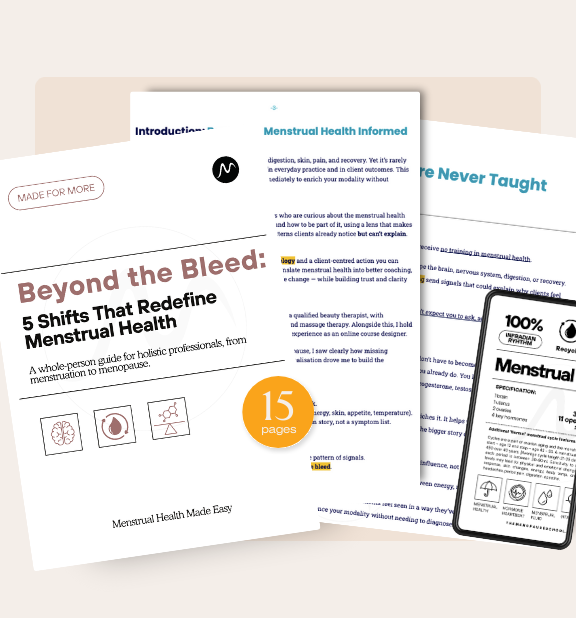Becoming a Menopause Doula
Why the silence around menstrual health created this role — and how an emerging talking therapy is reshaping the way we support menopause.

A Role That Transforms Lives
In the early 1990s, when I first trained as a beauty therapist, there was no mention of menstrual health. Not in the textbooks. Not in the classrooms. Not even whispered in treatment rooms. Clients never asked questions — not because they didn’t have challenges, but because they didn’t know those challenges were connected to perimenopause. And I didn’t see the links either. Neither of us was equipped. Had I been, I might have recognised that shoulder pain wasn’t just a tight muscle but part of a wider hormonal shift. Or that a new skin inflammation wasn’t about their skincare routine — it was a sign their skin itself had changed.
Looking back, I see just how many opportunities were missed. Opportunities to connect signals across all life stages, to explain what the body was really saying, to open conversations that could have changed lives.
One of my lightbulb moments came years later, reading a headline in the Telegraph: “Schoolgirls can’t take days off for periods as 'inconvenience is part of being a woman’, says headteacher.” It hit me that the silence wasn’t just around menopause. It started much earlier, in school corridors, with a negative script about menstruation and no meaningful education beyond reproductive cycles or period management. That silence follows us. It shapes how menstrual health is misunderstood, and why perimenopause so often feels like crashing into the unknown — even though the changes have been building for years.
Why this role matters
Becoming a Menopause Doula is about stepping into that silence — and filling it with informed, compassionate, and system-wide understanding. It’s not about symptom lists or quick fixes. It’s about seeing menopause transition as part of the menstrual health timeline, a biological rhythm that speaks through every system of the body.
This work is as much about listening as it is about teaching. It’s about helping someone see that their changing sleep, mood, digestion, or skin are not isolated frustrations but part of a bigger pattern. It’s about offering language where there was once only confusion. And it’s about reminding them that they are moving through a stage of ovarian ageing that can be understood, supported, and navigated.
The emergence of Menopause Talking Therapy
This is why I created Menopause Talking Therapy — an emerging modality that blends education with conversation. It’s not counselling. It’s not coaching. It’s a guided space where biology meets lived experience, where we map signs of change and build toolkits that make sense for real lives.
Every client who walks through the door deserves more than reassurance. They deserve clarity. They deserve to know what’s happening inside their bodies and how to respond. And they deserve a holistic health professional who is confident enough to hold that conversation with skill and care.
A growing movement
Becoming a Menopause Doula is not just another professional add-on. It’s an act of advocacy. It’s joining a growing movement to change the way menstrual health is understood — in clinics, in studios, in community spaces, and across society.
For holistic professionals, this role means weaving biology into practice without losing the art of connection. It means knowing when to educate, when to listen, and when to signpost. And it means being part of the shift that ensures no one has to face menopause uninformed or alone.
The conversation begins here. The rest — the frameworks, the tools, the practice — you’ll find as you step further into this work.





